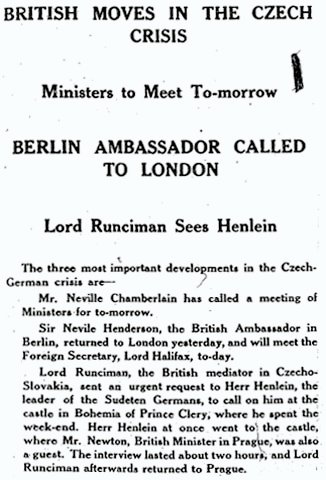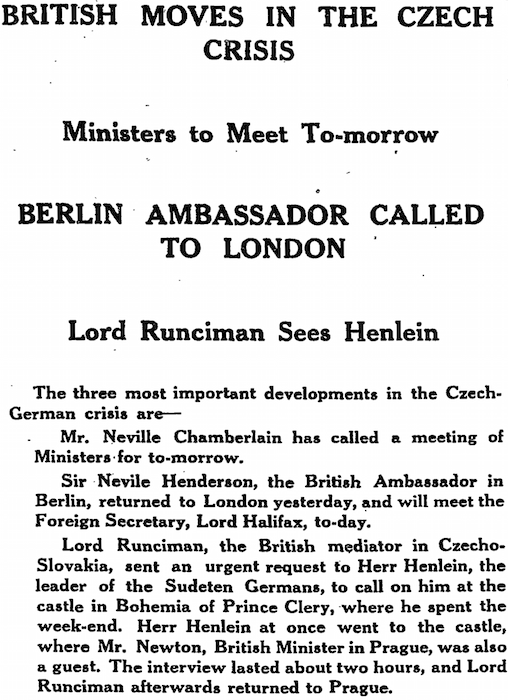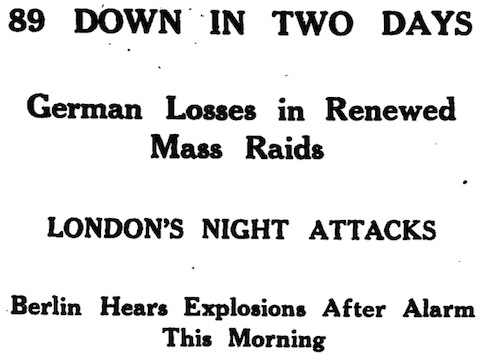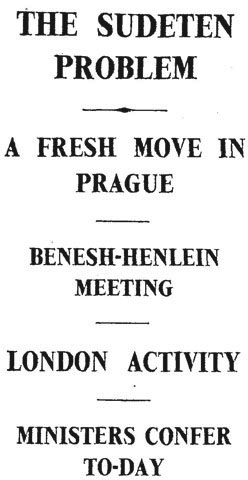
The Sudeten crisis (or Czech crisis, or Czech-German crisis as it is called here) wasn’t front-page news in the Manchester Guardian on 29 August — it was on page 9. But that was actually where most newspapers put the most important news. Compared with those of today, British newspapers of the 1930s and before seem to be inside out. The first few pages would have classified ads, then there might be sport, then domestic news. Then, in the middle spread, easy to find when you open the paper, would be the index, leading articles (editorials) and other commentary on the left-hand side, and the major news of the day on the right. (This particular issue had 16 pages, so the leaders were on page 8 and the news on page 9.) Then, on following pages, there might be foreign news, business news, and letters to the editor on the last page. So the Sudeten crisis wasn’t front-page news, it was middle-page news!
So, here we see that there is already fairly intense diplomatic activity going on. Neville Chamberlain, the Conservative prime minister (though leading a coalition National Government) is to meet with his ministers (those who were ‘available’: it was the end of summer and Parliament was in recess, so not everyone was around. Chamberlain himself had just returned from Hampshire). The ambassador to Germany, Sir Nevile Henderson (a pro-German — always what you want in an ambassador to Germany), has been recalled for discussions. And Konrad Henlein met with Lord Runciman on the weekend. Runciman was a former Liberal MP and minister who had been sent by Chamberlain (albeit in an unofficial capacity) to mediate between the Sudeten minority and the Czechoslovakian government after an earlier crisis. He was known to favour the Sudetens. Henlein was always described as the leader of the Sudeten Germans, but he was actually leader of the Sudeten German Party, which was not the same thing since the Sudetens did not have autonomy. Indeed, autonomy is ostensibly what Henlein was seeking on behalf of the Sudetens.
Related stories on this page (the above headlines take up about a quarter of the width) are:
Sir J. Simon’s Warning
Sir John Simon was the Chancellor of the Exchequer (treasurer), and a former Foreign Secretary. On the weekend he had given a speech in Lanark, where he repeated a statement made by Chamberlain earlier in the year to the effect that if a war started over the Sudeten issue, nobody could predict which countries might become involved. Which sounds bland today, but seems to have been correctly interpreted as a threat by the German press. On the other hand, the French would have liked something a bit more definite.
AMBASSADOR’S HURRIED JOURNEY
Situation Regarded as “Particularly Grave”
More on Henderson. His deputy was away on holiday, so he had to leave the embassy in the hands of a relatively junior diplomat — a sure sign of urgency.
SIR JOHN SIMON’S “GOOD INTENTIONS”
Italian press reaction to Simon’s speech — OK, it was seen as fairly bland there too.
LORD RUNCIMAN ACTIVE
Czechs’ New Terms
GERMANY’S SEARCH FOR “INCIDENTS”
The Latest “Atrocity”
From the central European correspondent. Not actually much about Runciman, more about a minor street skirmish between Sudetens and Czechs in Leitmeritz, but little damage was done. The Czechoslovakian government is reported to be considering a plan to add 23 (somewhat more) autonomous departments to the country’s administrative structure, some of which would be German in character.
TRYING TO MAKE THE CZECHS APPEAR AS AGGRESSORS
Explanation of Hitler’s Tactics
OPPOSITION OF GERMAN PEOPLE TO AGGRESSIVE WAR
The diplomatic correspondent explains why Germany is trying so hard to make the Czechs appear to be the aggressors: because the German people don’t want war. (Which was true.)
There is also related news on page 12 (the text of Simon’s speech, and Henlein’s demands) and page 13 (more on German and French press reactions, and German support for the Sudetens).
It’s not really clear from this issue of the Manchester Guardian just why this is a crisis, or at least why it is one that involves Britain in any way. Or why Simon felt the need to mention the W word. And Germany itself doesn’t appear to be doing much that is threatening right now. A casual (or non-) follower of foreign affairs at the time might have been confused too. Perhaps the next day’s news will make things clearer?
![]() This work is licensed under a Creative Commons Attribution-NonCommercial-NoDerivatives 4.0 International License.
Permissions beyond the scope of this license may be available at http://airminded.org/copyright/.
This work is licensed under a Creative Commons Attribution-NonCommercial-NoDerivatives 4.0 International License.
Permissions beyond the scope of this license may be available at http://airminded.org/copyright/.





Good post! I guess the world is much striker now when having to cope with such tactics. This is one of the cases in which we’ve learned from experiences
The Craven Herald and Pioneer in Skipton, North Yorkshire had a classified-ads front page, Victorian style until very recently.
Presumably, people would fold the paper open at the centre spread so as to read the news and also get the broadsheet down to an easier tube-reading size, from where it was only a small step to do it permanently.
Compared with those of today, British newspapers of the 1930s and before seem to be inside out.
True for the posh papers, but not the Mail, Express, Herald, Mirror, News Chronicle, etc., which were in a modern format by the 1930s.
Great first post. Even though may know how this issue we play out I expect to get a very real feeling for how leaders of the day grappled with the “Czech Crisis” as it unfolded.
What caught my interest in this first posting was the word “Czech” rather than the “Sudeten” in the headline.
I can hardly wait for the next posting – but I will have to won’t I – this is in real time!
I hope this experiment in replaying history is a resounding success.
Pingback: Airminded · Tuesday, 30 August 1938
Andrea:
Thanks, hope it continues to interest you.
Alex:
That could make sense. About the folding, I mean, not about the Craven Herald and Pioneer! Why did it stick to that format so long? Stubbornness?
Alan:
Yes, quite right, I was a bit imprecise there. I think the Daily Herald was always like that, in fact, or at least the 1913 issues I looked at years ago were. But the Daily Mail actually didn’t switch until 4 September 1939. (So readers could immediately see the important news, according to its own explanation, and also because it was dropping down to 12 pages to conserve paper. Hopefully advertisers would understand …)
Jon:
Exactly! It’s easy to skim over an event like this when it’s a paragraph or a page in a book, which makes it seem smaller than it was to the people who lived through it. Not that I pretend that I’m in any way recreating the real experience of the Sudeten crisis (whatever that would mean), it’s nothing more than a nod towards that.
The Daily Mail actually didn’t switch until 4 September 1939.
Interesting – I didn’t know that (I’m more familiar with the papers of the Forties). I assumed that since it was aiming for a mass middle-market the Mail had made the switch long before 1939.
Pingback: Airminded · Wednesday, 31 August 1938
That’s what I assumed too. Maybe Rothermere preferred to keep it that way because it was posh? Or maybe it was just because of the advertising revenue.
Pingback: Investigations of a Dog » Fables of the Reconstruction